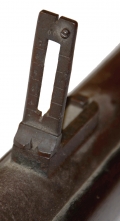site search
online catalog
CIVIL WAR IMPORT LIEGE-MADE FRENCH MODEL 1842 INFANTRY MUSKET

$895.00 SOLD
Quantity Available: None
Item Code: 480-181
This is a very good example of one of the tens of thousands of European muskets and rifles imported to army early war volunteers in the Civil War. Many of these arms were made in the Belgian city of Liege, whose gun makers produced copies of regulation arms for a number of European countries. This is a copy a French infantry rifled musket and is clearly marked on the lock plate “LEMILLE / A LIEGE” with European stock marks on the left butt flat and wrist. Also stamped clearly on the wrist is “G.A. SMITH,” who could have been a soldier, but also an arms importer or one of the U.S. agents scouring Europe for military arms.
The follows the general lines of the French infantry musket of 1842, slightly modified in 1857. It is iron mounted, with three barrel bands, the upper band being double, with a barrel-mounted blade front sight, bayonet stud mounted under the muzzle, and has been rifled and fitted with a folding long range rear sight. As was common, it was left in its .70/.71 caliber. As is characteristic of many French and Liege arms, it has a back action lock, with the lock plate secured at the rear by a screw requiring a special screwdriver to discourage meddling by curious privates. (In European armies the sergeant was often the lowest ranking soldier to be equiped with the necessary gun tools.)
The metal is smooth overall with a matching thin brown patina mixing with underlying pewter gray. Bands, sights (including ladder on rear sight,) ramrod, bayonet stud, swivels, etc. are in place. The wood fits the metal tightly and has nice color and surface with just a few dings on the left forestock, forward of the middle band. The stamped markings in the wood are crisp. The mechanism needs a little tinkering: the hammer holds at full cock, but not at half-cock. Imported arms played a key role in the war, particularly in the early years before U.S armories and contractors could catch up in production. Some estimates of imported French and Belgian arms place their numbers close to 150,000 and they are frequently referred to by soldiers. This is a very good example that would fit a collection of Civil War longarms or show off well with a set of early-war accouterments. [SR]
DISCLAIMER: All firearms are sold as collector's items only - we do not accept responsibility as to the shooting safety or reliability of any antique firearm. All firearms are described as accurately as possible, given the restraints of a catalog listing length. We want satisfied customers & often "under" describe the weapons. Any city or state regulations regarding owning antique firearms are the responsibility of the purchaser. All firearms are "mechanically perfect" unless noted, but again, are NOT warranted as safe to fire.
~~~~~~~~~~~~~~~~~~~~~~~~~~~~~~~~~~~
THIS ITEM, AS WITH ALL OTHER ITEMS AVAILABLE ON OUR WEB SITE,
MAY BE PURCHASED THROUGH OUR LAYAWAY PROGRAM.
FOR OUR POLICIES AND TERMS,
CLICK ON ‘CONTACT US’ AT THE TOP OF ANY PAGE ON THE SITE,
THEN ON ‘LAYAWAY POLICY’.
THANK YOU!
Inquire About CIVIL WAR IMPORT LIEGE-MADE FRENCH MODEL 1842 INFANTRY MUSKET
For inquiries, please email us at [email protected]
Most Popular
Historical Firearms Stolen From The National Civil War Museum In Harrisburg, Pa »
Theft From Gravesite Of Gen. John Reynolds »
Selection Of Unframed Prints By Don Troiani »
Fine Condition Brass Infantry Bugle Insignia »
British Imported, Confederate Used Bayonet »
Scarce New Model 1865 Sharps Still In Percussion Near Factory New »
featured item
IDENTIFIED CIVIL WAR US NAVY GROUP OF G.W. BROWN, PUBLISHED IN TIME-LIFE AND IN BLUEJACKETS, EX-STAMATELOS COLLECTION AND TEXAS CIVIL WAR MUSEUM
This a very scarce, extensive, identified Civil War U.S. Navy grouping, once in the renowned Stamatelos collection and more recently exhibited in the Texas Civil War Museum. It has also been published several times: most notably in Ron Field’s… (1179-262). Learn More »
site search
Upcoming Events
May 16 - 18: N-SSA Spring Nationals, Fort Shenandoah, Winchester, VA Learn More »





















